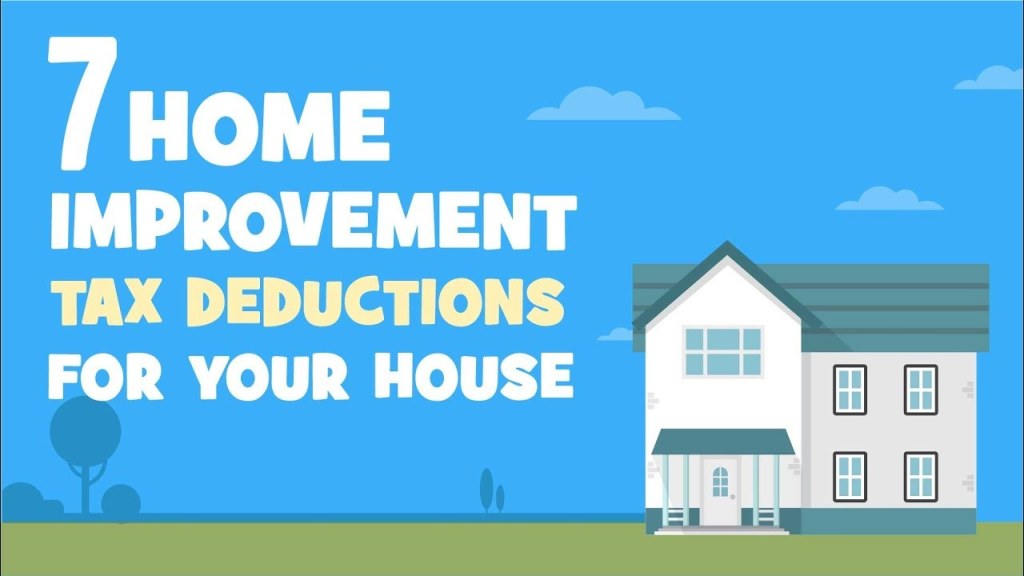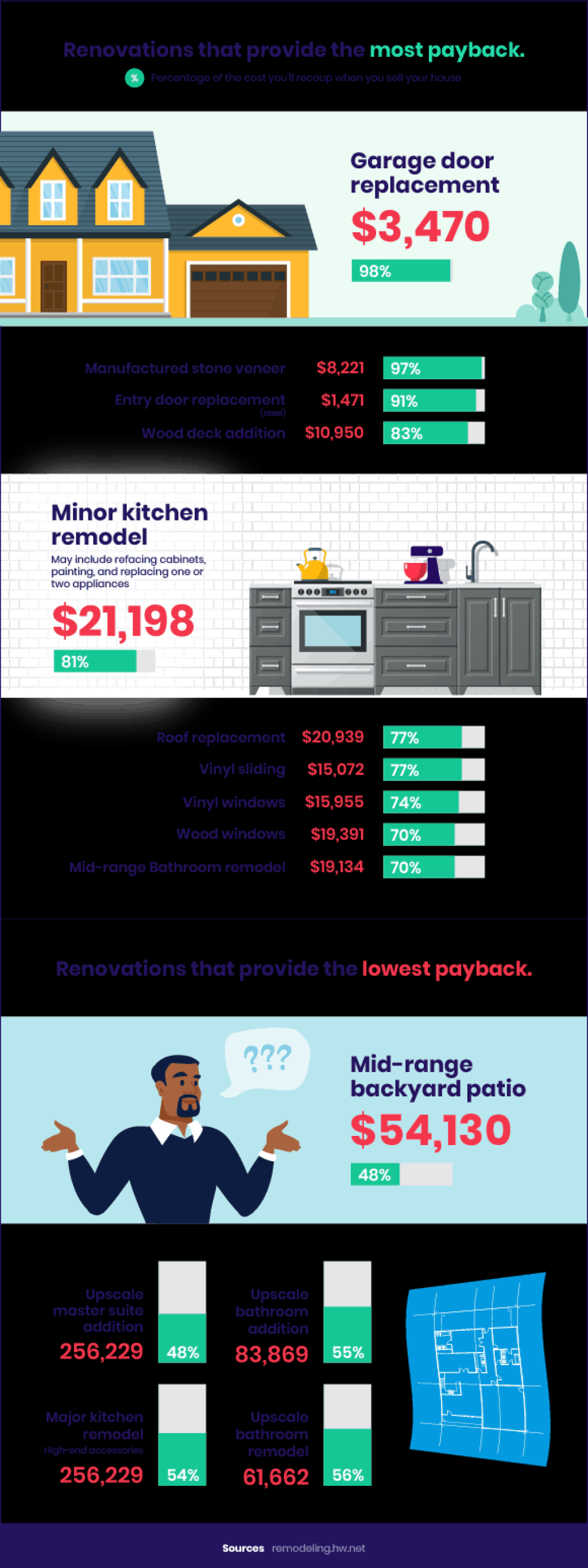Home Improvement Deductions
Greetings, Readers!
Welcome to our informative article on home improvement deductions. In this piece, we will explore the various aspects of home improvement deductions, including what they are, who is eligible for them, when they can be claimed, where to find more information, why they are important, and how to take advantage of them. So let’s dive in and discover the ins and outs of home improvement deductions!
Introduction
Home improvement deductions refer to tax deductions that homeowners can claim for expenses related to renovations, repairs, or upgrades made to their homes. These deductions can be a valuable way to save money and reduce the financial burden of home improvement projects. To help you navigate this topic effectively, we have compiled a comprehensive guide that covers everything you need to know about home improvement deductions.
What are Home Improvement Deductions? 🏠💰
Home improvement deductions are tax benefits provided to homeowners to offset the costs of improving their properties. These deductions are aimed at encouraging homeowners to invest in their homes, which in turn contributes to the overall improvement of neighborhoods and the housing market. By claiming these deductions, homeowners can reduce their taxable income and potentially receive a larger tax refund.
There are various types of home improvement deductions available, including deductions for energy-efficient upgrades, medical necessity modifications, and home office expenses. Each type of deduction has its own set of requirements and qualifications, so it is essential to understand the specifics before claiming them.
Energy-Efficient Upgrades
![home improvement deductions - Home Improvement Tax Deductions [INFOGRAPHIC] Tax deductions home improvement deductions - Home Improvement Tax Deductions [INFOGRAPHIC] Tax deductions](https://imprell.info/wp-content/uploads/2023/09/home-improvement-tax-deductions-infographic-tax-deductions.jpg)
Image Source: pinimg.com
One popular category of home improvement deductions is for energy-efficient upgrades. This includes expenses related to the installation of solar panels, energy-efficient windows, insulation, and other eco-friendly improvements. By making these upgrades, homeowners not only benefit from reduced energy bills but also contribute to the conservation of the environment.
Medical Necessity Modifications
Another type of home improvement deduction is available for homeowners who make modifications to their homes for medical necessity. These deductions can include expenses for installing wheelchair ramps, accessible bathrooms, or other modifications that accommodate individuals with disabilities. By claiming these deductions, homeowners can make their homes more accessible and comfortable for themselves or their loved ones.
Home Office Expenses
For those who have a designated home office, there are deductions available for related expenses. This can include costs for office supplies, furniture, internet services, and even a portion of your rent or mortgage that corresponds to the space used as a home office. These deductions are especially beneficial for self-employed individuals or those who work remotely.
Who is Eligible for Home Improvement Deductions? 🏡✅
The eligibility criteria for home improvement deductions vary depending on the specific deduction being claimed. Generally, homeowners who own and occupy their homes are eligible to claim these deductions. However, certain deductions may have additional requirements, such as income limits or specific documentation.
It is important to note that home improvement deductions are typically only available for expenses related to a primary residence. Second homes, rental properties, or vacation homes may not qualify for these deductions. Additionally, some deductions may require the homeowner to keep records or receipts as proof of the expenses incurred.
When Can Home Improvement Deductions Be Claimed? ⏰

Image Source: ytimg.com
Home improvement deductions can typically be claimed in the same year that the expenses were incurred. However, there may be exceptions for certain deductions that allow for carryovers or multi-year claims. It is essential to consult with a tax professional or refer to the specific guidelines provided by the tax authorities to determine the appropriate timing for claiming these deductions.
Where to Find More Information About Home Improvement Deductions? 📚🔍
For detailed information about home improvement deductions, it is advisable to refer to your country’s tax authority website. They often provide comprehensive guides and resources that explain the various deductions available, eligibility criteria, and how to claim them correctly. Additionally, consulting with a tax professional can provide personalized advice and ensure compliance with the latest tax regulations.
Why Are Home Improvement Deductions Important? ❓💡
Home improvement deductions play a crucial role in incentivizing homeowners to invest in their properties. By offering tax benefits, governments encourage individuals to make upgrades and improvements, leading to enhanced living conditions and increased property values. These deductions can also help homeowners offset the financial burden of home improvement projects, making them more affordable and accessible.
How to Take Advantage of Home Improvement Deductions? 📝🔑
To take advantage of home improvement deductions, it is essential to keep detailed records of all related expenses. This includes invoices, receipts, and any supporting documentation that verifies the costs incurred. Additionally, staying informed about the available deductions and their specific requirements will help ensure that you meet all eligibility criteria and claim the deductions correctly.
Consulting with a tax professional is highly recommended to maximize your deductions and avoid any potential errors or oversights. They can provide personalized guidance based on your specific situation and help you navigate the complexities of tax regulations.
Advantages and Disadvantages of Home Improvement Deductions 📊👍👎

Image Source: taxact.com
Like any tax-related matter, home improvement deductions come with advantages and disadvantages. Let’s explore both sides to help you make an informed decision:
Advantages of Home Improvement Deductions 👍
1. Tax Savings: Home improvement deductions can significantly reduce your taxable income, potentially resulting in a larger tax refund or lower tax liability.
2. Financial Incentives: These deductions serve as incentives for homeowners to invest in their properties, contributing to the overall improvement of neighborhoods and housing markets.
3. Energy Efficiency: Deductions for eco-friendly upgrades promote the use of sustainable materials and technologies, leading to reduced energy consumption and a greener environment.
4. Accessibility: Home improvement deductions for medical necessity modifications help create accessible living spaces for individuals with disabilities, improving their quality of life.
5. Home Office Support: Deductions for home office expenses provide financial relief to self-employed individuals and remote workers, allowing them to create a productive work environment.
Disadvantages of Home Improvement Deductions 👎
1. Complex Requirements: Some deductions may have specific qualifications and documentation requirements, making it crucial to thoroughly understand the rules before claiming them.
2. Limited Scope: Home improvement deductions may not be available for certain types of properties, such as second homes or rental properties.
3. Potential Audits: Claiming deductions incorrectly or without proper documentation can increase the risk of being audited by tax authorities.
4. Time and Effort: Gathering and organizing the necessary paperwork for claiming deductions can be time-consuming and require meticulous record-keeping.
5. Changing Regulations: Tax laws and regulations can change over time, affecting the availability and eligibility criteria for home improvement deductions.
Frequently Asked Questions (FAQs) ❔🗨️
1. Are home improvement expenses always tax-deductible?
No, not all home improvement expenses are tax-deductible. Only expenses that meet certain criteria, such as energy efficiency upgrades or medical necessity modifications, may qualify for deductions. It is essential to consult the specific guidelines provided by your tax authority.
2. Can I claim home improvement deductions for rental properties?
Generally, home improvement deductions are available only for expenses related to a primary residence. Rental properties may have different tax rules and regulations. It is advisable to consult with a tax professional or refer to the guidelines provided by your country’s tax authority.
3. Do I need to hire a professional to prepare my tax return for claiming home improvement deductions?
While it is not mandatory, hiring a tax professional can be beneficial when claiming home improvement deductions. They can provide expert advice, ensure accurate filing, and help you maximize your deductions. However, individuals with a good understanding of tax regulations can also prepare their tax returns themselves.
4. How long do I need to keep records of home improvement expenses?
It is recommended to keep records of home improvement expenses for at least three years after filing your tax return. These records should include invoices, receipts, contracts, and any other documentation that supports your claimed deductions.
5. Can I claim home improvement deductions for DIY projects?
In some cases, expenses for do-it-yourself (DIY) home improvement projects may be eligible for deductions. However, it is important to note that certain requirements must be met, such as using materials that qualify for deductions or obtaining necessary permits. It is advisable to consult with a tax professional to ensure compliance with the regulations.
Conclusion: Take Advantage of Home Improvement Deductions! 🏡💪
Now that you have a comprehensive understanding of home improvement deductions, it’s time to leverage this knowledge to your advantage. By exploring the available deductions, understanding the eligibility criteria, and seeking professional advice when needed, you can maximize your savings while improving your home. So don’t miss out on the potential tax benefits and start planning your next home improvement project today!
Thank you for reading our informative article. We hope you found it helpful and insightful. If you have any further questions or need assistance, feel free to reach out to us. Happy home improving, Friends!
Final Remarks: Disclaimer
The information provided in this article is for general informational purposes only and should not be considered as professional tax advice. Tax laws and regulations may vary depending on your jurisdiction. It is strongly recommended to consult with a qualified tax professional or refer to the guidelines provided by your country’s tax authority before claiming any deductions or making financial decisions. We do not assume any liability for the accuracy, completeness, or relevance of the information presented.